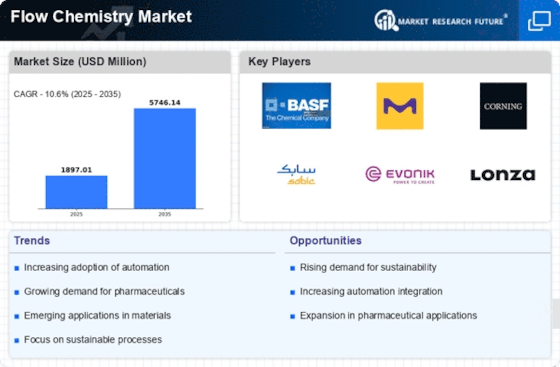Market Trends
Key Emerging Trends in the Flow Chemistry Market
The Flow Chemistry market is experiencing significant growth and evolving trends, influenced by advancements in technology, increasing adoption across various industries, and the demand for more efficient and sustainable chemical processes. Flow chemistry, also known as continuous flow chemistry or microreactor chemistry, involves performing chemical reactions in a continuous stream rather than in traditional batch reactors. One prominent trend in the Flow Chemistry market is the growing adoption of this technology in pharmaceutical and fine chemical manufacturing. Pharmaceutical companies are increasingly turning to flow chemistry for its ability to streamline synthesis processes, reduce reaction times, and improve product quality, ultimately leading to cost savings and enhanced drug discovery and development.
Moreover, the demand for safer and more sustainable manufacturing processes is driving the adoption of flow chemistry across industries. Flow reactors offer better control over reaction parameters such as temperature, pressure, and mixing, resulting in higher yields, fewer by-products, and reduced energy consumption compared to batch processes. This trend aligns with the growing emphasis on sustainability and environmental stewardship, prompting companies to seek greener alternatives to traditional chemical synthesis methods.
Another key trend in the Flow Chemistry market is the integration of automation and digitalization technologies to enhance process control and efficiency. Automation enables the continuous monitoring and optimization of reaction parameters in real-time, allowing for greater precision, reproducibility, and scalability of flow chemistry processes. Additionally, digital tools such as predictive modeling, machine learning, and process simulation software facilitate the design and optimization of flow reactor systems, accelerating innovation and reducing time-to-market for new chemical products.
Furthermore, the expansion of the specialty chemicals and agrochemicals sectors is driving demand for flow chemistry solutions. Flow reactors enable the rapid synthesis of complex molecules and intermediates, making them well-suited for the production of specialty chemicals used in industries such as cosmetics, food additives, and agrochemicals. By leveraging the benefits of flow chemistry, manufacturers can improve product quality, increase production flexibility, and respond more effectively to changing market demands.
The Flow Chemistry market is also witnessing growth opportunities in emerging regions such as Asia-Pacific and Latin America, driven by increasing investments in research and development, infrastructure development, and the expansion of the chemical manufacturing base. Countries like China, India, and Brazil are experiencing rapid industrialization and urbanization, leading to greater demand for chemicals and pharmaceuticals and driving the adoption of advanced manufacturing technologies like flow chemistry.
Additionally, collaborations and partnerships between academic institutions, research organizations, and industry players are fueling innovation and driving the development of new flow chemistry technologies and applications. These collaborations facilitate knowledge exchange, access to state-of-the-art equipment, and joint research initiatives, accelerating the commercialization of flow chemistry solutions and expanding their potential applications across diverse industries.
The COVID-19 pandemic has also impacted the Flow Chemistry market, highlighting the importance of resilience and adaptability in chemical manufacturing. While the initial disruptions in supply chains and workforce availability posed challenges to the industry, the crisis has spurred greater interest in flexible and decentralized manufacturing technologies like flow chemistry. Companies are investing in digital infrastructure, remote monitoring systems, and flexible production platforms to enhance resilience and mitigate future disruptions.


















Leave a Comment